Impact of Innovation, Technology, and CSR: A TUI Report
VerifiedAdded on 2023/01/09
|11
|3078
|34
Report
AI Summary
This report provides a comprehensive analysis of TUI's integration of innovation, technology, and Corporate Social Responsibility (CSR). It begins by defining innovation and technology, offering examples of their contribution to economic growth, and describing how businesses, including TUI, leverage new technologies in their operations. The report then delves into TUI's use of digital marketing, virtual reality, and artificial intelligence, comparing sales and profits before and after the implementation of these technologies. Furthermore, the report defines corporate governance, provides a brief history in the UK, and defines CSR, emphasizing its importance for organizations like TUI. It outlines the four areas of CSR as defined by Archie Carroll, evaluating how TUI addresses these responsibilities. The report examines how TUI employs digital marketing, virtual reality, and artificial intelligence, comparing sales and profits before and after the implementation of these technologies, and concludes with an assessment of TUI's overall approach to innovation, technology, and CSR.

Word document
Paraphrase This Document
Need a fresh take? Get an instant paraphrase of this document with our AI Paraphraser
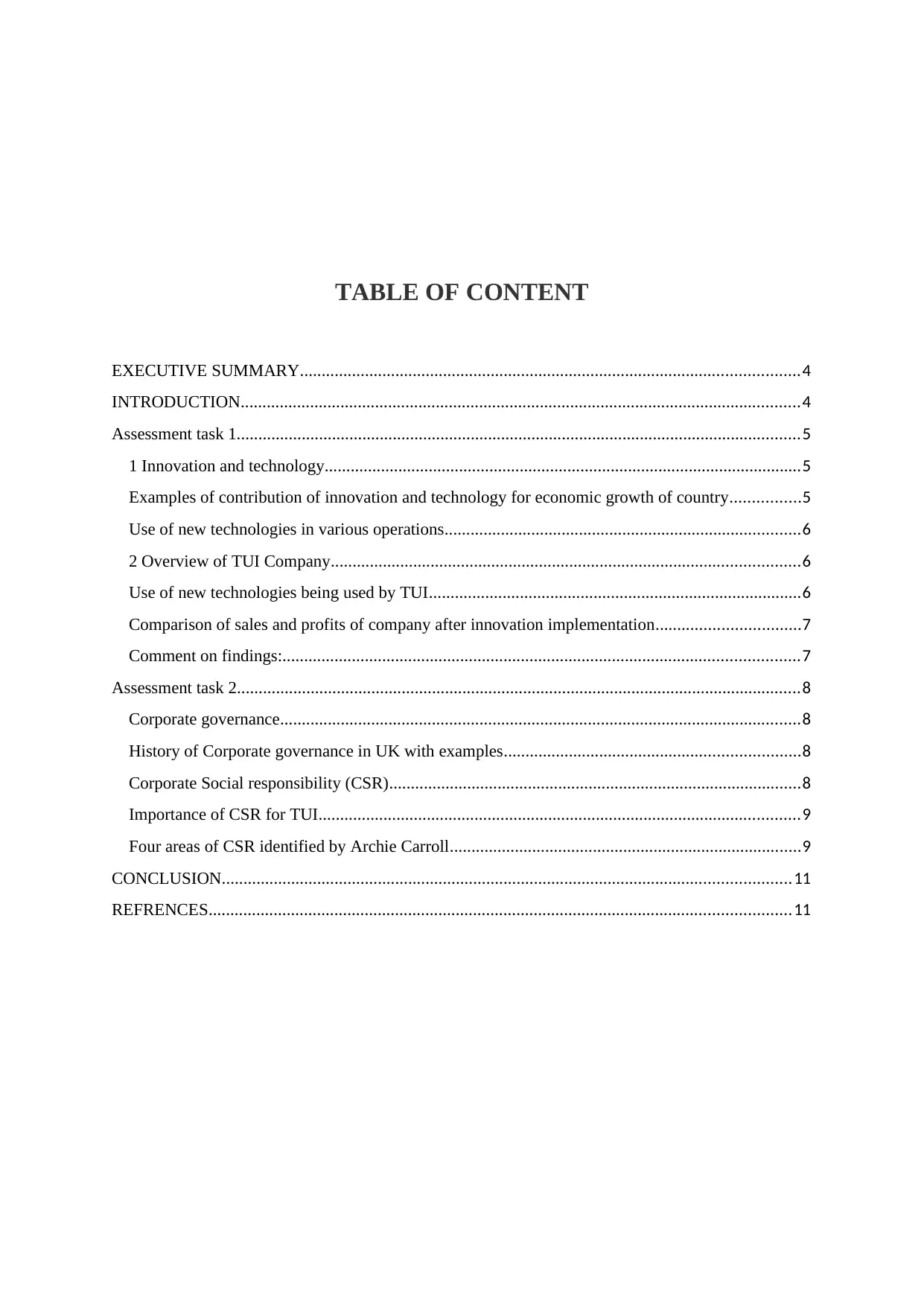
TABLE OF CONTENT
EXECUTIVE SUMMARY...................................................................................................................4
INTRODUCTION.................................................................................................................................4
Assessment task 1..................................................................................................................................5
1 Innovation and technology..............................................................................................................5
Examples of contribution of innovation and technology for economic growth of country................5
Use of new technologies in various operations..................................................................................6
2 Overview of TUI Company............................................................................................................6
Use of new technologies being used by TUI......................................................................................6
Comparison of sales and profits of company after innovation implementation.................................7
Comment on findings:.......................................................................................................................7
Assessment task 2..................................................................................................................................8
Corporate governance........................................................................................................................8
History of Corporate governance in UK with examples....................................................................8
Corporate Social responsibility (CSR)...............................................................................................8
Importance of CSR for TUI...............................................................................................................9
Four areas of CSR identified by Archie Carroll.................................................................................9
CONCLUSION...................................................................................................................................11
REFRENCES......................................................................................................................................11
EXECUTIVE SUMMARY...................................................................................................................4
INTRODUCTION.................................................................................................................................4
Assessment task 1..................................................................................................................................5
1 Innovation and technology..............................................................................................................5
Examples of contribution of innovation and technology for economic growth of country................5
Use of new technologies in various operations..................................................................................6
2 Overview of TUI Company............................................................................................................6
Use of new technologies being used by TUI......................................................................................6
Comparison of sales and profits of company after innovation implementation.................................7
Comment on findings:.......................................................................................................................7
Assessment task 2..................................................................................................................................8
Corporate governance........................................................................................................................8
History of Corporate governance in UK with examples....................................................................8
Corporate Social responsibility (CSR)...............................................................................................8
Importance of CSR for TUI...............................................................................................................9
Four areas of CSR identified by Archie Carroll.................................................................................9
CONCLUSION...................................................................................................................................11
REFRENCES......................................................................................................................................11
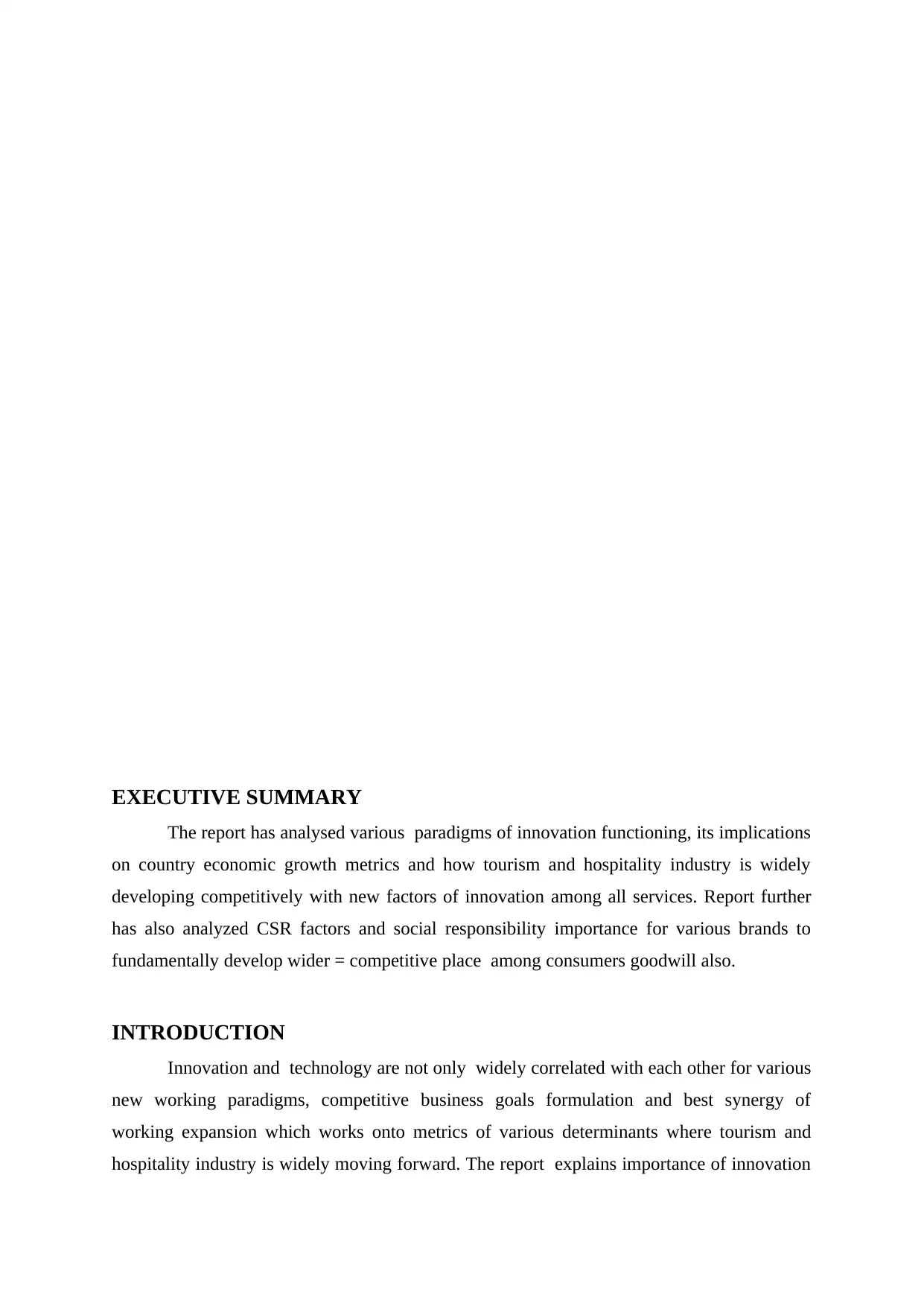
EXECUTIVE SUMMARY
The report has analysed various paradigms of innovation functioning, its implications
on country economic growth metrics and how tourism and hospitality industry is widely
developing competitively with new factors of innovation among all services. Report further
has also analyzed CSR factors and social responsibility importance for various brands to
fundamentally develop wider = competitive place among consumers goodwill also.
INTRODUCTION
Innovation and technology are not only widely correlated with each other for various
new working paradigms, competitive business goals formulation and best synergy of
working expansion which works onto metrics of various determinants where tourism and
hospitality industry is widely moving forward. The report explains importance of innovation
The report has analysed various paradigms of innovation functioning, its implications
on country economic growth metrics and how tourism and hospitality industry is widely
developing competitively with new factors of innovation among all services. Report further
has also analyzed CSR factors and social responsibility importance for various brands to
fundamentally develop wider = competitive place among consumers goodwill also.
INTRODUCTION
Innovation and technology are not only widely correlated with each other for various
new working paradigms, competitive business goals formulation and best synergy of
working expansion which works onto metrics of various determinants where tourism and
hospitality industry is widely moving forward. The report explains importance of innovation
⊘ This is a preview!⊘
Do you want full access?
Subscribe today to unlock all pages.

Trusted by 1+ million students worldwide
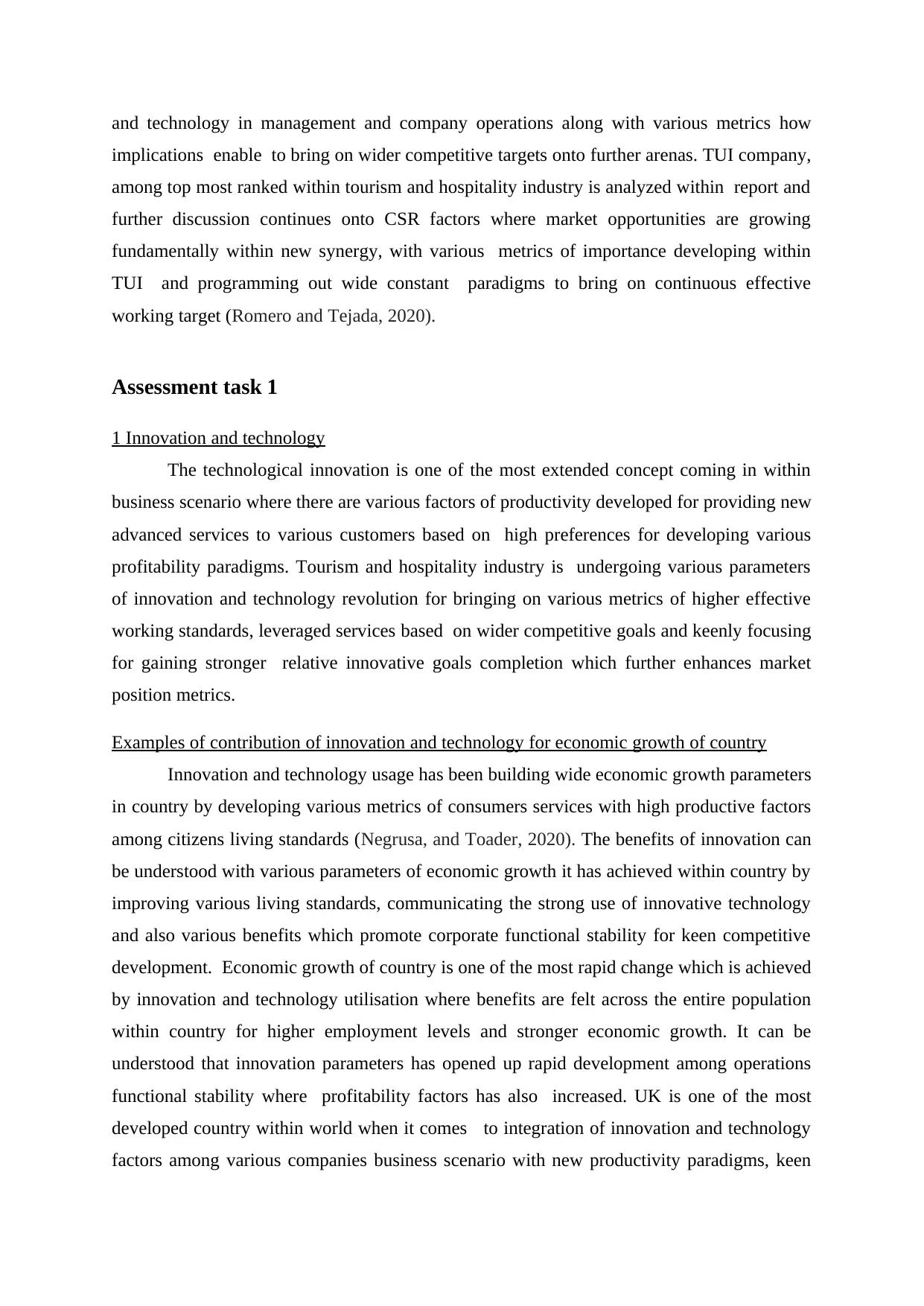
and technology in management and company operations along with various metrics how
implications enable to bring on wider competitive targets onto further arenas. TUI company,
among top most ranked within tourism and hospitality industry is analyzed within report and
further discussion continues onto CSR factors where market opportunities are growing
fundamentally within new synergy, with various metrics of importance developing within
TUI and programming out wide constant paradigms to bring on continuous effective
working target (Romero and Tejada, 2020).
Assessment task 1
1 Innovation and technology
The technological innovation is one of the most extended concept coming in within
business scenario where there are various factors of productivity developed for providing new
advanced services to various customers based on high preferences for developing various
profitability paradigms. Tourism and hospitality industry is undergoing various parameters
of innovation and technology revolution for bringing on various metrics of higher effective
working standards, leveraged services based on wider competitive goals and keenly focusing
for gaining stronger relative innovative goals completion which further enhances market
position metrics.
Examples of contribution of innovation and technology for economic growth of country
Innovation and technology usage has been building wide economic growth parameters
in country by developing various metrics of consumers services with high productive factors
among citizens living standards (Negrusa, and Toader, 2020). The benefits of innovation can
be understood with various parameters of economic growth it has achieved within country by
improving various living standards, communicating the strong use of innovative technology
and also various benefits which promote corporate functional stability for keen competitive
development. Economic growth of country is one of the most rapid change which is achieved
by innovation and technology utilisation where benefits are felt across the entire population
within country for higher employment levels and stronger economic growth. It can be
understood that innovation parameters has opened up rapid development among operations
functional stability where profitability factors has also increased. UK is one of the most
developed country within world when it comes to integration of innovation and technology
factors among various companies business scenario with new productivity paradigms, keen
implications enable to bring on wider competitive targets onto further arenas. TUI company,
among top most ranked within tourism and hospitality industry is analyzed within report and
further discussion continues onto CSR factors where market opportunities are growing
fundamentally within new synergy, with various metrics of importance developing within
TUI and programming out wide constant paradigms to bring on continuous effective
working target (Romero and Tejada, 2020).
Assessment task 1
1 Innovation and technology
The technological innovation is one of the most extended concept coming in within
business scenario where there are various factors of productivity developed for providing new
advanced services to various customers based on high preferences for developing various
profitability paradigms. Tourism and hospitality industry is undergoing various parameters
of innovation and technology revolution for bringing on various metrics of higher effective
working standards, leveraged services based on wider competitive goals and keenly focusing
for gaining stronger relative innovative goals completion which further enhances market
position metrics.
Examples of contribution of innovation and technology for economic growth of country
Innovation and technology usage has been building wide economic growth parameters
in country by developing various metrics of consumers services with high productive factors
among citizens living standards (Negrusa, and Toader, 2020). The benefits of innovation can
be understood with various parameters of economic growth it has achieved within country by
improving various living standards, communicating the strong use of innovative technology
and also various benefits which promote corporate functional stability for keen competitive
development. Economic growth of country is one of the most rapid change which is achieved
by innovation and technology utilisation where benefits are felt across the entire population
within country for higher employment levels and stronger economic growth. It can be
understood that innovation parameters has opened up rapid development among operations
functional stability where profitability factors has also increased. UK is one of the most
developed country within world when it comes to integration of innovation and technology
factors among various companies business scenario with new productivity paradigms, keen
Paraphrase This Document
Need a fresh take? Get an instant paraphrase of this document with our AI Paraphraser
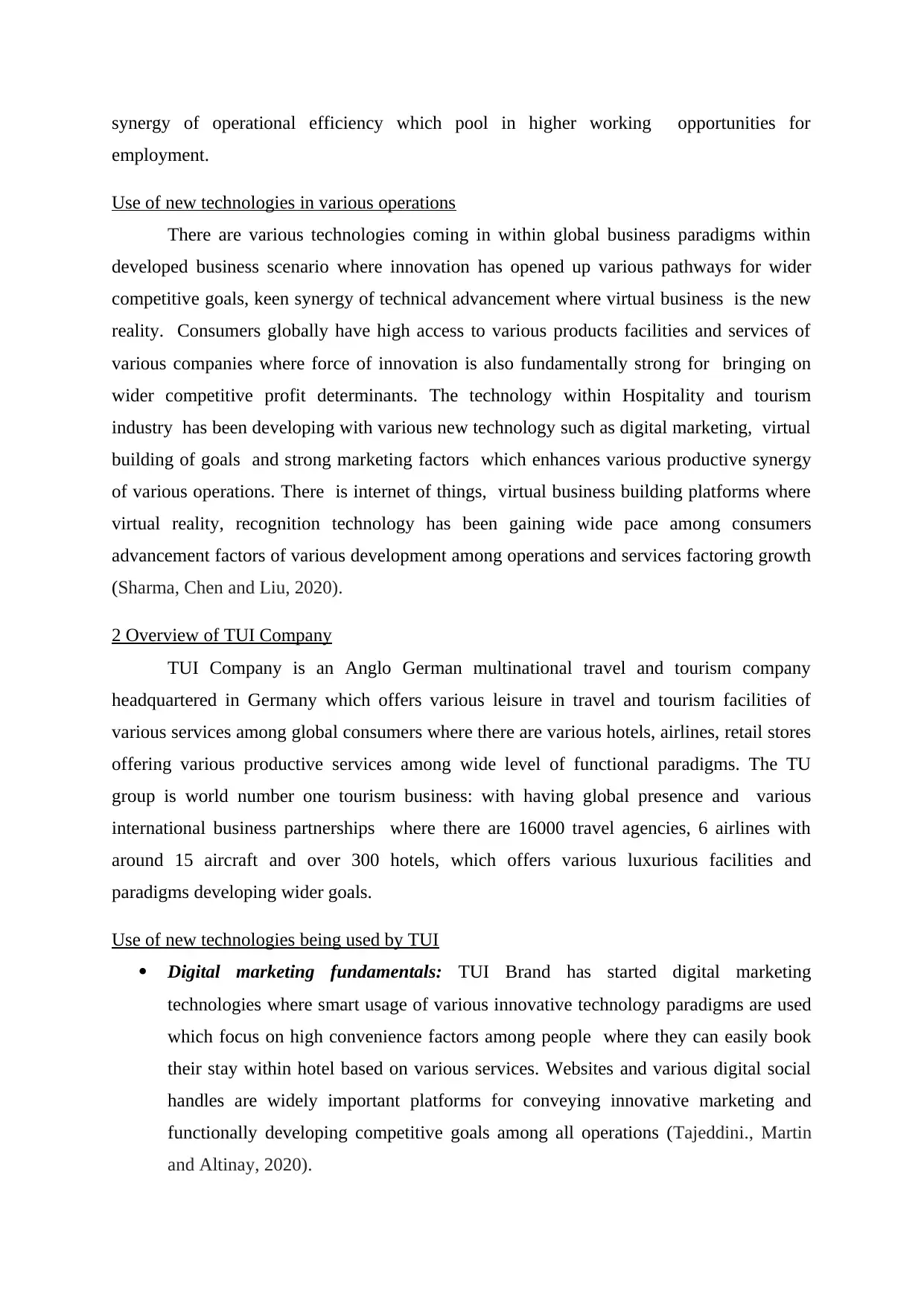
synergy of operational efficiency which pool in higher working opportunities for
employment.
Use of new technologies in various operations
There are various technologies coming in within global business paradigms within
developed business scenario where innovation has opened up various pathways for wider
competitive goals, keen synergy of technical advancement where virtual business is the new
reality. Consumers globally have high access to various products facilities and services of
various companies where force of innovation is also fundamentally strong for bringing on
wider competitive profit determinants. The technology within Hospitality and tourism
industry has been developing with various new technology such as digital marketing, virtual
building of goals and strong marketing factors which enhances various productive synergy
of various operations. There is internet of things, virtual business building platforms where
virtual reality, recognition technology has been gaining wide pace among consumers
advancement factors of various development among operations and services factoring growth
(Sharma, Chen and Liu, 2020).
2 Overview of TUI Company
TUI Company is an Anglo German multinational travel and tourism company
headquartered in Germany which offers various leisure in travel and tourism facilities of
various services among global consumers where there are various hotels, airlines, retail stores
offering various productive services among wide level of functional paradigms. The TU
group is world number one tourism business: with having global presence and various
international business partnerships where there are 16000 travel agencies, 6 airlines with
around 15 aircraft and over 300 hotels, which offers various luxurious facilities and
paradigms developing wider goals.
Use of new technologies being used by TUI
Digital marketing fundamentals: TUI Brand has started digital marketing
technologies where smart usage of various innovative technology paradigms are used
which focus on high convenience factors among people where they can easily book
their stay within hotel based on various services. Websites and various digital social
handles are widely important platforms for conveying innovative marketing and
functionally developing competitive goals among all operations (Tajeddini., Martin
and Altinay, 2020).
employment.
Use of new technologies in various operations
There are various technologies coming in within global business paradigms within
developed business scenario where innovation has opened up various pathways for wider
competitive goals, keen synergy of technical advancement where virtual business is the new
reality. Consumers globally have high access to various products facilities and services of
various companies where force of innovation is also fundamentally strong for bringing on
wider competitive profit determinants. The technology within Hospitality and tourism
industry has been developing with various new technology such as digital marketing, virtual
building of goals and strong marketing factors which enhances various productive synergy
of various operations. There is internet of things, virtual business building platforms where
virtual reality, recognition technology has been gaining wide pace among consumers
advancement factors of various development among operations and services factoring growth
(Sharma, Chen and Liu, 2020).
2 Overview of TUI Company
TUI Company is an Anglo German multinational travel and tourism company
headquartered in Germany which offers various leisure in travel and tourism facilities of
various services among global consumers where there are various hotels, airlines, retail stores
offering various productive services among wide level of functional paradigms. The TU
group is world number one tourism business: with having global presence and various
international business partnerships where there are 16000 travel agencies, 6 airlines with
around 15 aircraft and over 300 hotels, which offers various luxurious facilities and
paradigms developing wider goals.
Use of new technologies being used by TUI
Digital marketing fundamentals: TUI Brand has started digital marketing
technologies where smart usage of various innovative technology paradigms are used
which focus on high convenience factors among people where they can easily book
their stay within hotel based on various services. Websites and various digital social
handles are widely important platforms for conveying innovative marketing and
functionally developing competitive goals among all operations (Tajeddini., Martin
and Altinay, 2020).
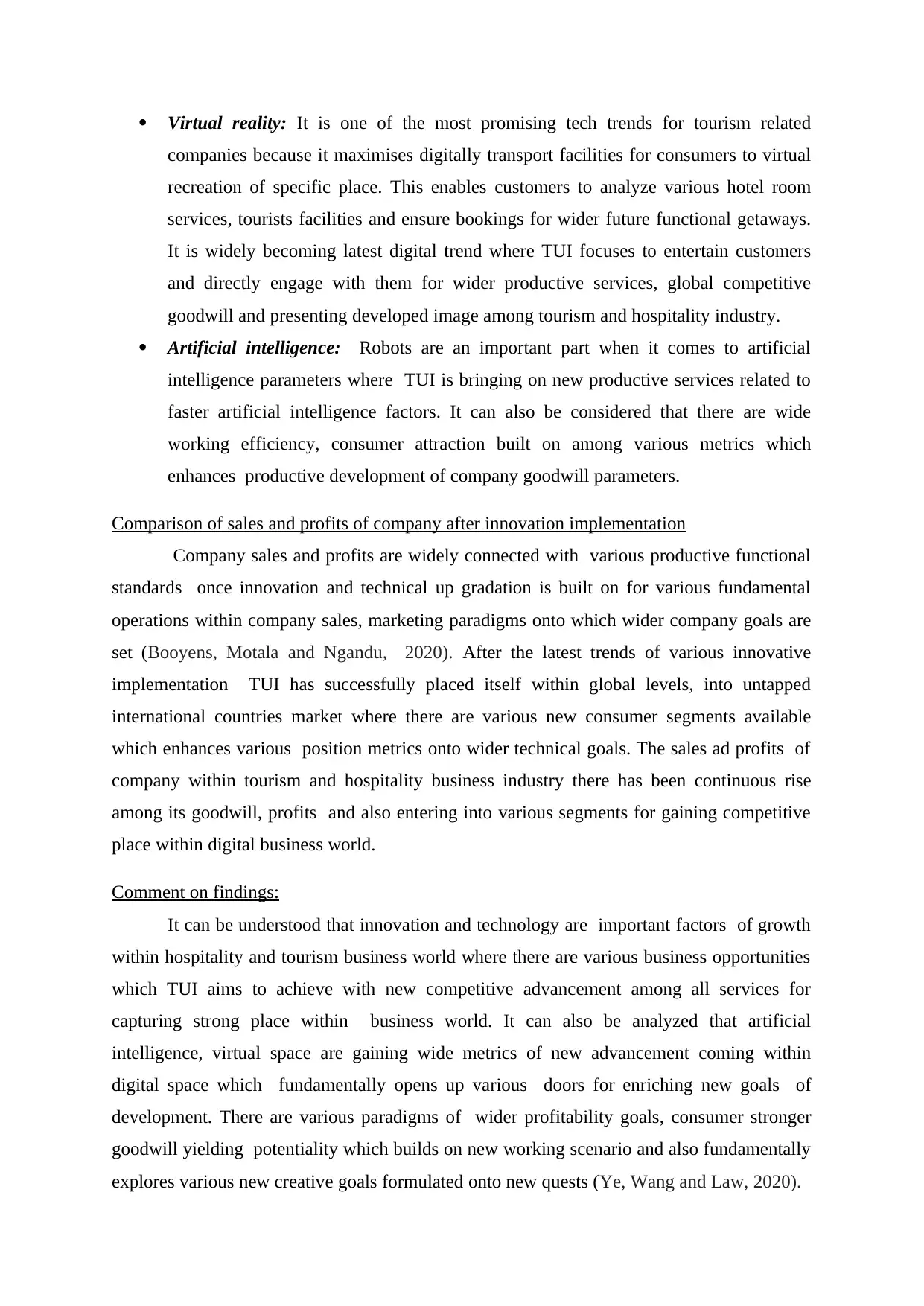
Virtual reality: It is one of the most promising tech trends for tourism related
companies because it maximises digitally transport facilities for consumers to virtual
recreation of specific place. This enables customers to analyze various hotel room
services, tourists facilities and ensure bookings for wider future functional getaways.
It is widely becoming latest digital trend where TUI focuses to entertain customers
and directly engage with them for wider productive services, global competitive
goodwill and presenting developed image among tourism and hospitality industry.
Artificial intelligence: Robots are an important part when it comes to artificial
intelligence parameters where TUI is bringing on new productive services related to
faster artificial intelligence factors. It can also be considered that there are wide
working efficiency, consumer attraction built on among various metrics which
enhances productive development of company goodwill parameters.
Comparison of sales and profits of company after innovation implementation
Company sales and profits are widely connected with various productive functional
standards once innovation and technical up gradation is built on for various fundamental
operations within company sales, marketing paradigms onto which wider company goals are
set (Booyens, Motala and Ngandu, 2020). After the latest trends of various innovative
implementation TUI has successfully placed itself within global levels, into untapped
international countries market where there are various new consumer segments available
which enhances various position metrics onto wider technical goals. The sales ad profits of
company within tourism and hospitality business industry there has been continuous rise
among its goodwill, profits and also entering into various segments for gaining competitive
place within digital business world.
Comment on findings:
It can be understood that innovation and technology are important factors of growth
within hospitality and tourism business world where there are various business opportunities
which TUI aims to achieve with new competitive advancement among all services for
capturing strong place within business world. It can also be analyzed that artificial
intelligence, virtual space are gaining wide metrics of new advancement coming within
digital space which fundamentally opens up various doors for enriching new goals of
development. There are various paradigms of wider profitability goals, consumer stronger
goodwill yielding potentiality which builds on new working scenario and also fundamentally
explores various new creative goals formulated onto new quests (Ye, Wang and Law, 2020).
companies because it maximises digitally transport facilities for consumers to virtual
recreation of specific place. This enables customers to analyze various hotel room
services, tourists facilities and ensure bookings for wider future functional getaways.
It is widely becoming latest digital trend where TUI focuses to entertain customers
and directly engage with them for wider productive services, global competitive
goodwill and presenting developed image among tourism and hospitality industry.
Artificial intelligence: Robots are an important part when it comes to artificial
intelligence parameters where TUI is bringing on new productive services related to
faster artificial intelligence factors. It can also be considered that there are wide
working efficiency, consumer attraction built on among various metrics which
enhances productive development of company goodwill parameters.
Comparison of sales and profits of company after innovation implementation
Company sales and profits are widely connected with various productive functional
standards once innovation and technical up gradation is built on for various fundamental
operations within company sales, marketing paradigms onto which wider company goals are
set (Booyens, Motala and Ngandu, 2020). After the latest trends of various innovative
implementation TUI has successfully placed itself within global levels, into untapped
international countries market where there are various new consumer segments available
which enhances various position metrics onto wider technical goals. The sales ad profits of
company within tourism and hospitality business industry there has been continuous rise
among its goodwill, profits and also entering into various segments for gaining competitive
place within digital business world.
Comment on findings:
It can be understood that innovation and technology are important factors of growth
within hospitality and tourism business world where there are various business opportunities
which TUI aims to achieve with new competitive advancement among all services for
capturing strong place within business world. It can also be analyzed that artificial
intelligence, virtual space are gaining wide metrics of new advancement coming within
digital space which fundamentally opens up various doors for enriching new goals of
development. There are various paradigms of wider profitability goals, consumer stronger
goodwill yielding potentiality which builds on new working scenario and also fundamentally
explores various new creative goals formulated onto new quests (Ye, Wang and Law, 2020).
⊘ This is a preview!⊘
Do you want full access?
Subscribe today to unlock all pages.

Trusted by 1+ million students worldwide
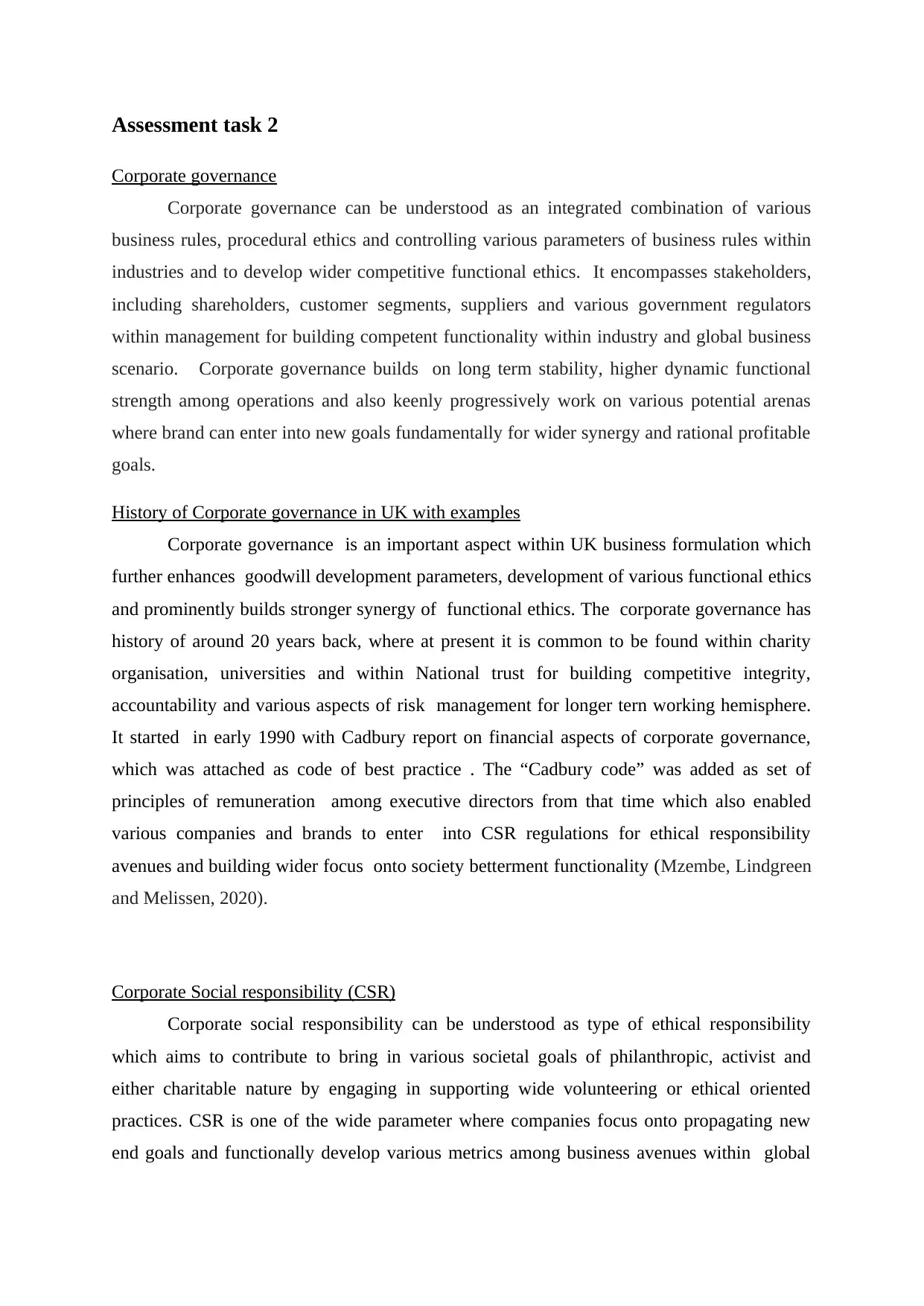
Assessment task 2
Corporate governance
Corporate governance can be understood as an integrated combination of various
business rules, procedural ethics and controlling various parameters of business rules within
industries and to develop wider competitive functional ethics. It encompasses stakeholders,
including shareholders, customer segments, suppliers and various government regulators
within management for building competent functionality within industry and global business
scenario. Corporate governance builds on long term stability, higher dynamic functional
strength among operations and also keenly progressively work on various potential arenas
where brand can enter into new goals fundamentally for wider synergy and rational profitable
goals.
History of Corporate governance in UK with examples
Corporate governance is an important aspect within UK business formulation which
further enhances goodwill development parameters, development of various functional ethics
and prominently builds stronger synergy of functional ethics. The corporate governance has
history of around 20 years back, where at present it is common to be found within charity
organisation, universities and within National trust for building competitive integrity,
accountability and various aspects of risk management for longer tern working hemisphere.
It started in early 1990 with Cadbury report on financial aspects of corporate governance,
which was attached as code of best practice . The “Cadbury code” was added as set of
principles of remuneration among executive directors from that time which also enabled
various companies and brands to enter into CSR regulations for ethical responsibility
avenues and building wider focus onto society betterment functionality (Mzembe, Lindgreen
and Melissen, 2020).
Corporate Social responsibility (CSR)
Corporate social responsibility can be understood as type of ethical responsibility
which aims to contribute to bring in various societal goals of philanthropic, activist and
either charitable nature by engaging in supporting wide volunteering or ethical oriented
practices. CSR is one of the wide parameter where companies focus onto propagating new
end goals and functionally develop various metrics among business avenues within global
Corporate governance
Corporate governance can be understood as an integrated combination of various
business rules, procedural ethics and controlling various parameters of business rules within
industries and to develop wider competitive functional ethics. It encompasses stakeholders,
including shareholders, customer segments, suppliers and various government regulators
within management for building competent functionality within industry and global business
scenario. Corporate governance builds on long term stability, higher dynamic functional
strength among operations and also keenly progressively work on various potential arenas
where brand can enter into new goals fundamentally for wider synergy and rational profitable
goals.
History of Corporate governance in UK with examples
Corporate governance is an important aspect within UK business formulation which
further enhances goodwill development parameters, development of various functional ethics
and prominently builds stronger synergy of functional ethics. The corporate governance has
history of around 20 years back, where at present it is common to be found within charity
organisation, universities and within National trust for building competitive integrity,
accountability and various aspects of risk management for longer tern working hemisphere.
It started in early 1990 with Cadbury report on financial aspects of corporate governance,
which was attached as code of best practice . The “Cadbury code” was added as set of
principles of remuneration among executive directors from that time which also enabled
various companies and brands to enter into CSR regulations for ethical responsibility
avenues and building wider focus onto society betterment functionality (Mzembe, Lindgreen
and Melissen, 2020).
Corporate Social responsibility (CSR)
Corporate social responsibility can be understood as type of ethical responsibility
which aims to contribute to bring in various societal goals of philanthropic, activist and
either charitable nature by engaging in supporting wide volunteering or ethical oriented
practices. CSR is one of the wide parameter where companies focus onto propagating new
end goals and functionally develop various metrics among business avenues within global
Paraphrase This Document
Need a fresh take? Get an instant paraphrase of this document with our AI Paraphraser
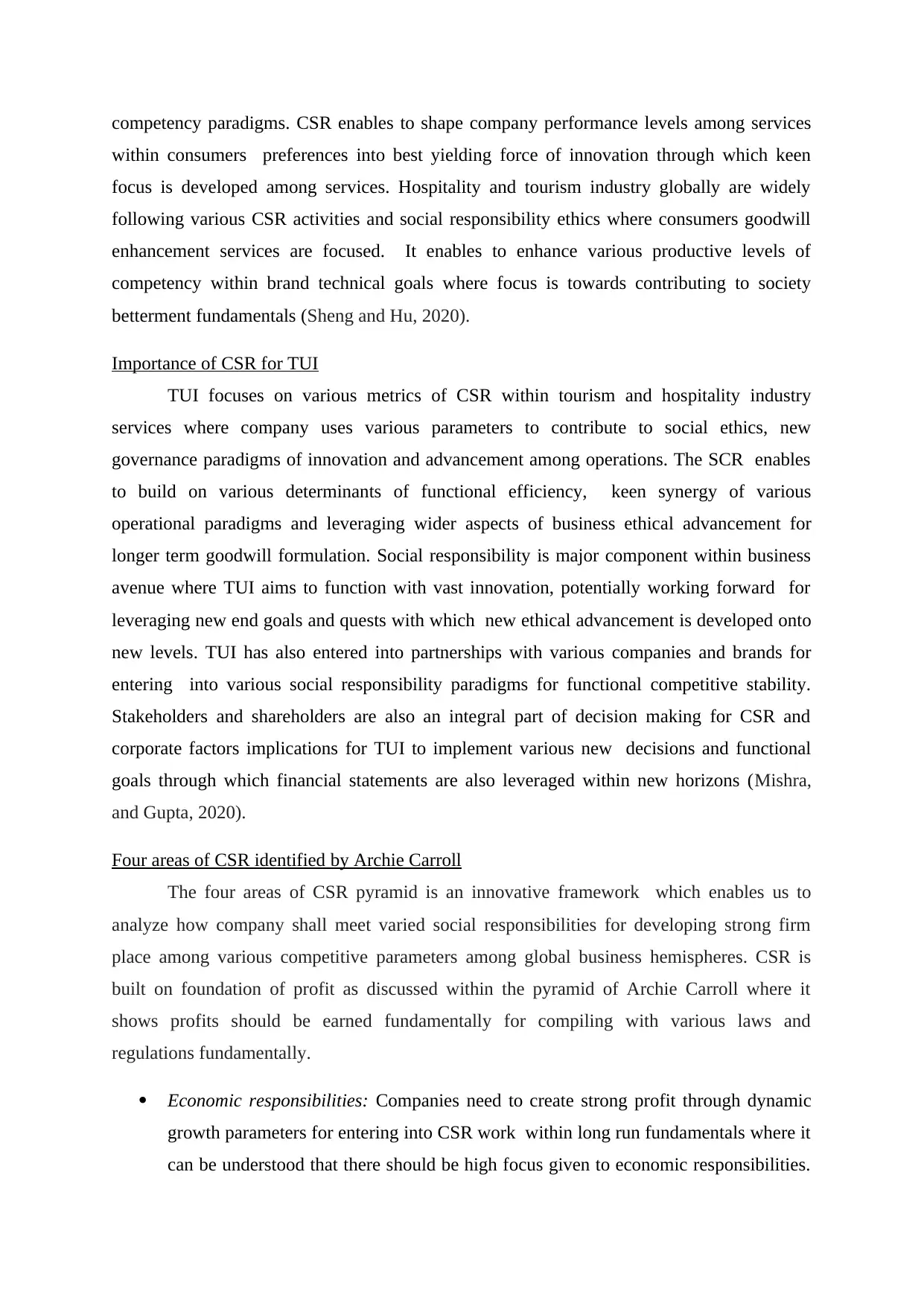
competency paradigms. CSR enables to shape company performance levels among services
within consumers preferences into best yielding force of innovation through which keen
focus is developed among services. Hospitality and tourism industry globally are widely
following various CSR activities and social responsibility ethics where consumers goodwill
enhancement services are focused. It enables to enhance various productive levels of
competency within brand technical goals where focus is towards contributing to society
betterment fundamentals (Sheng and Hu, 2020).
Importance of CSR for TUI
TUI focuses on various metrics of CSR within tourism and hospitality industry
services where company uses various parameters to contribute to social ethics, new
governance paradigms of innovation and advancement among operations. The SCR enables
to build on various determinants of functional efficiency, keen synergy of various
operational paradigms and leveraging wider aspects of business ethical advancement for
longer term goodwill formulation. Social responsibility is major component within business
avenue where TUI aims to function with vast innovation, potentially working forward for
leveraging new end goals and quests with which new ethical advancement is developed onto
new levels. TUI has also entered into partnerships with various companies and brands for
entering into various social responsibility paradigms for functional competitive stability.
Stakeholders and shareholders are also an integral part of decision making for CSR and
corporate factors implications for TUI to implement various new decisions and functional
goals through which financial statements are also leveraged within new horizons (Mishra,
and Gupta, 2020).
Four areas of CSR identified by Archie Carroll
The four areas of CSR pyramid is an innovative framework which enables us to
analyze how company shall meet varied social responsibilities for developing strong firm
place among various competitive parameters among global business hemispheres. CSR is
built on foundation of profit as discussed within the pyramid of Archie Carroll where it
shows profits should be earned fundamentally for compiling with various laws and
regulations fundamentally.
Economic responsibilities: Companies need to create strong profit through dynamic
growth parameters for entering into CSR work within long run fundamentals where it
can be understood that there should be high focus given to economic responsibilities.
within consumers preferences into best yielding force of innovation through which keen
focus is developed among services. Hospitality and tourism industry globally are widely
following various CSR activities and social responsibility ethics where consumers goodwill
enhancement services are focused. It enables to enhance various productive levels of
competency within brand technical goals where focus is towards contributing to society
betterment fundamentals (Sheng and Hu, 2020).
Importance of CSR for TUI
TUI focuses on various metrics of CSR within tourism and hospitality industry
services where company uses various parameters to contribute to social ethics, new
governance paradigms of innovation and advancement among operations. The SCR enables
to build on various determinants of functional efficiency, keen synergy of various
operational paradigms and leveraging wider aspects of business ethical advancement for
longer term goodwill formulation. Social responsibility is major component within business
avenue where TUI aims to function with vast innovation, potentially working forward for
leveraging new end goals and quests with which new ethical advancement is developed onto
new levels. TUI has also entered into partnerships with various companies and brands for
entering into various social responsibility paradigms for functional competitive stability.
Stakeholders and shareholders are also an integral part of decision making for CSR and
corporate factors implications for TUI to implement various new decisions and functional
goals through which financial statements are also leveraged within new horizons (Mishra,
and Gupta, 2020).
Four areas of CSR identified by Archie Carroll
The four areas of CSR pyramid is an innovative framework which enables us to
analyze how company shall meet varied social responsibilities for developing strong firm
place among various competitive parameters among global business hemispheres. CSR is
built on foundation of profit as discussed within the pyramid of Archie Carroll where it
shows profits should be earned fundamentally for compiling with various laws and
regulations fundamentally.
Economic responsibilities: Companies need to create strong profit through dynamic
growth parameters for entering into CSR work within long run fundamentals where it
can be understood that there should be high focus given to economic responsibilities.
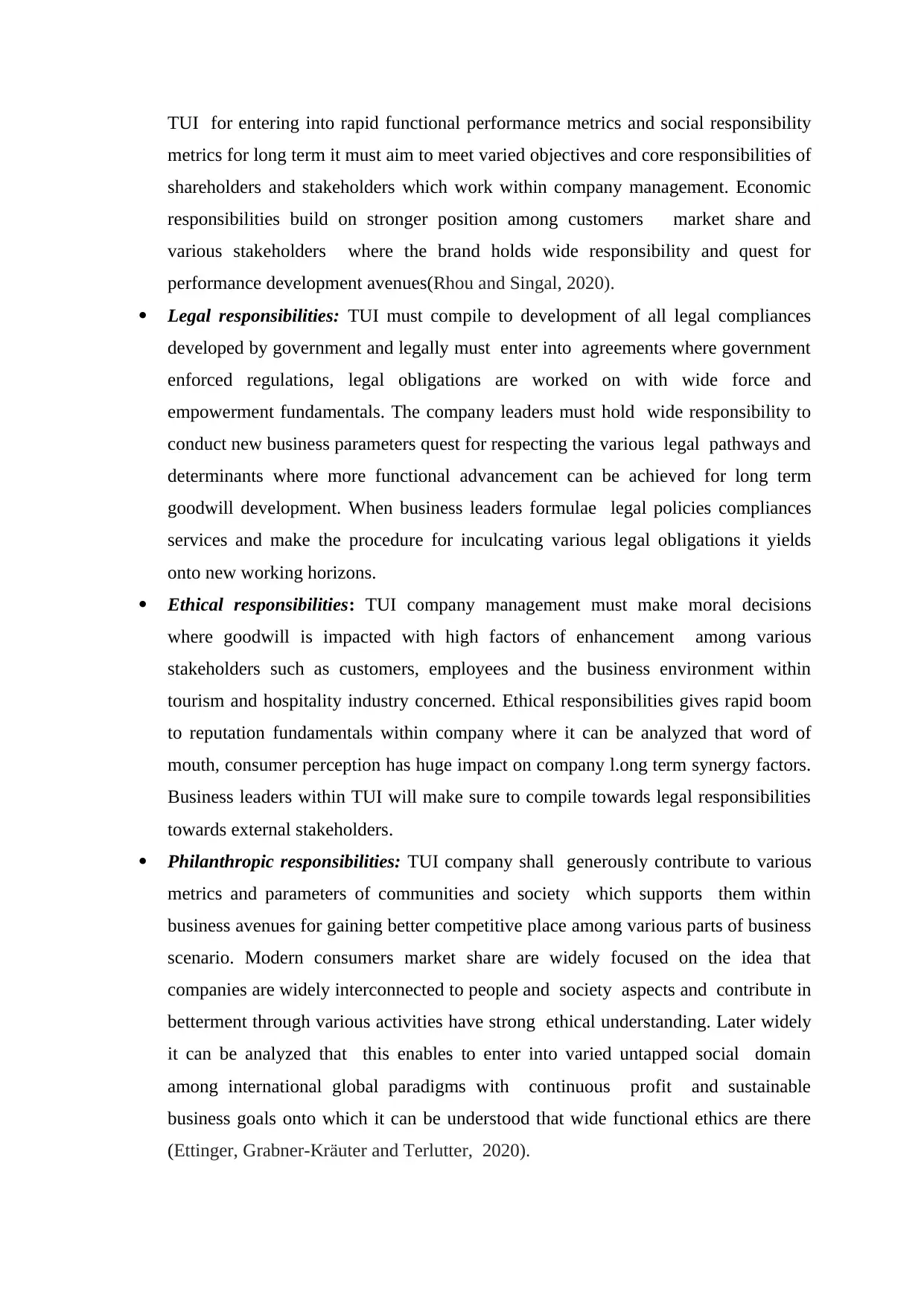
TUI for entering into rapid functional performance metrics and social responsibility
metrics for long term it must aim to meet varied objectives and core responsibilities of
shareholders and stakeholders which work within company management. Economic
responsibilities build on stronger position among customers market share and
various stakeholders where the brand holds wide responsibility and quest for
performance development avenues(Rhou and Singal, 2020).
Legal responsibilities: TUI must compile to development of all legal compliances
developed by government and legally must enter into agreements where government
enforced regulations, legal obligations are worked on with wide force and
empowerment fundamentals. The company leaders must hold wide responsibility to
conduct new business parameters quest for respecting the various legal pathways and
determinants where more functional advancement can be achieved for long term
goodwill development. When business leaders formulae legal policies compliances
services and make the procedure for inculcating various legal obligations it yields
onto new working horizons.
Ethical responsibilities: TUI company management must make moral decisions
where goodwill is impacted with high factors of enhancement among various
stakeholders such as customers, employees and the business environment within
tourism and hospitality industry concerned. Ethical responsibilities gives rapid boom
to reputation fundamentals within company where it can be analyzed that word of
mouth, consumer perception has huge impact on company l.ong term synergy factors.
Business leaders within TUI will make sure to compile towards legal responsibilities
towards external stakeholders.
Philanthropic responsibilities: TUI company shall generously contribute to various
metrics and parameters of communities and society which supports them within
business avenues for gaining better competitive place among various parts of business
scenario. Modern consumers market share are widely focused on the idea that
companies are widely interconnected to people and society aspects and contribute in
betterment through various activities have strong ethical understanding. Later widely
it can be analyzed that this enables to enter into varied untapped social domain
among international global paradigms with continuous profit and sustainable
business goals onto which it can be understood that wide functional ethics are there
(Ettinger, Grabner-Kräuter and Terlutter, 2020).
metrics for long term it must aim to meet varied objectives and core responsibilities of
shareholders and stakeholders which work within company management. Economic
responsibilities build on stronger position among customers market share and
various stakeholders where the brand holds wide responsibility and quest for
performance development avenues(Rhou and Singal, 2020).
Legal responsibilities: TUI must compile to development of all legal compliances
developed by government and legally must enter into agreements where government
enforced regulations, legal obligations are worked on with wide force and
empowerment fundamentals. The company leaders must hold wide responsibility to
conduct new business parameters quest for respecting the various legal pathways and
determinants where more functional advancement can be achieved for long term
goodwill development. When business leaders formulae legal policies compliances
services and make the procedure for inculcating various legal obligations it yields
onto new working horizons.
Ethical responsibilities: TUI company management must make moral decisions
where goodwill is impacted with high factors of enhancement among various
stakeholders such as customers, employees and the business environment within
tourism and hospitality industry concerned. Ethical responsibilities gives rapid boom
to reputation fundamentals within company where it can be analyzed that word of
mouth, consumer perception has huge impact on company l.ong term synergy factors.
Business leaders within TUI will make sure to compile towards legal responsibilities
towards external stakeholders.
Philanthropic responsibilities: TUI company shall generously contribute to various
metrics and parameters of communities and society which supports them within
business avenues for gaining better competitive place among various parts of business
scenario. Modern consumers market share are widely focused on the idea that
companies are widely interconnected to people and society aspects and contribute in
betterment through various activities have strong ethical understanding. Later widely
it can be analyzed that this enables to enter into varied untapped social domain
among international global paradigms with continuous profit and sustainable
business goals onto which it can be understood that wide functional ethics are there
(Ettinger, Grabner-Kräuter and Terlutter, 2020).
⊘ This is a preview!⊘
Do you want full access?
Subscribe today to unlock all pages.

Trusted by 1+ million students worldwide
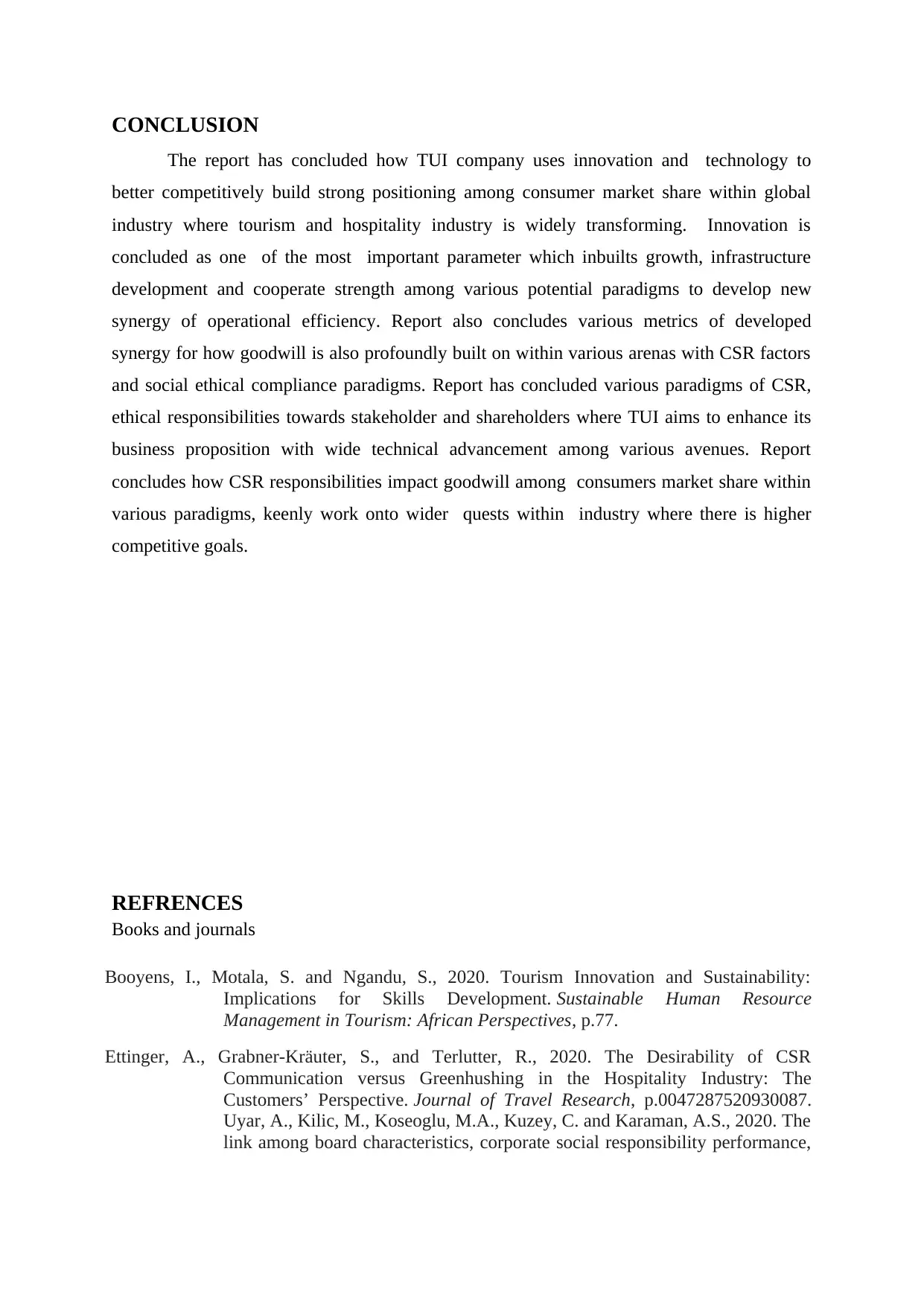
CONCLUSION
The report has concluded how TUI company uses innovation and technology to
better competitively build strong positioning among consumer market share within global
industry where tourism and hospitality industry is widely transforming. Innovation is
concluded as one of the most important parameter which inbuilts growth, infrastructure
development and cooperate strength among various potential paradigms to develop new
synergy of operational efficiency. Report also concludes various metrics of developed
synergy for how goodwill is also profoundly built on within various arenas with CSR factors
and social ethical compliance paradigms. Report has concluded various paradigms of CSR,
ethical responsibilities towards stakeholder and shareholders where TUI aims to enhance its
business proposition with wide technical advancement among various avenues. Report
concludes how CSR responsibilities impact goodwill among consumers market share within
various paradigms, keenly work onto wider quests within industry where there is higher
competitive goals.
REFRENCES
Books and journals
Booyens, I., Motala, S. and Ngandu, S., 2020. Tourism Innovation and Sustainability:
Implications for Skills Development. Sustainable Human Resource
Management in Tourism: African Perspectives, p.77.
Ettinger, A., Grabner-Kräuter, S., and Terlutter, R., 2020. The Desirability of CSR
Communication versus Greenhushing in the Hospitality Industry: The
Customers’ Perspective. Journal of Travel Research, p.0047287520930087.
Uyar, A., Kilic, M., Koseoglu, M.A., Kuzey, C. and Karaman, A.S., 2020. The
link among board characteristics, corporate social responsibility performance,
The report has concluded how TUI company uses innovation and technology to
better competitively build strong positioning among consumer market share within global
industry where tourism and hospitality industry is widely transforming. Innovation is
concluded as one of the most important parameter which inbuilts growth, infrastructure
development and cooperate strength among various potential paradigms to develop new
synergy of operational efficiency. Report also concludes various metrics of developed
synergy for how goodwill is also profoundly built on within various arenas with CSR factors
and social ethical compliance paradigms. Report has concluded various paradigms of CSR,
ethical responsibilities towards stakeholder and shareholders where TUI aims to enhance its
business proposition with wide technical advancement among various avenues. Report
concludes how CSR responsibilities impact goodwill among consumers market share within
various paradigms, keenly work onto wider quests within industry where there is higher
competitive goals.
REFRENCES
Books and journals
Booyens, I., Motala, S. and Ngandu, S., 2020. Tourism Innovation and Sustainability:
Implications for Skills Development. Sustainable Human Resource
Management in Tourism: African Perspectives, p.77.
Ettinger, A., Grabner-Kräuter, S., and Terlutter, R., 2020. The Desirability of CSR
Communication versus Greenhushing in the Hospitality Industry: The
Customers’ Perspective. Journal of Travel Research, p.0047287520930087.
Uyar, A., Kilic, M., Koseoglu, M.A., Kuzey, C. and Karaman, A.S., 2020. The
link among board characteristics, corporate social responsibility performance,
Paraphrase This Document
Need a fresh take? Get an instant paraphrase of this document with our AI Paraphraser
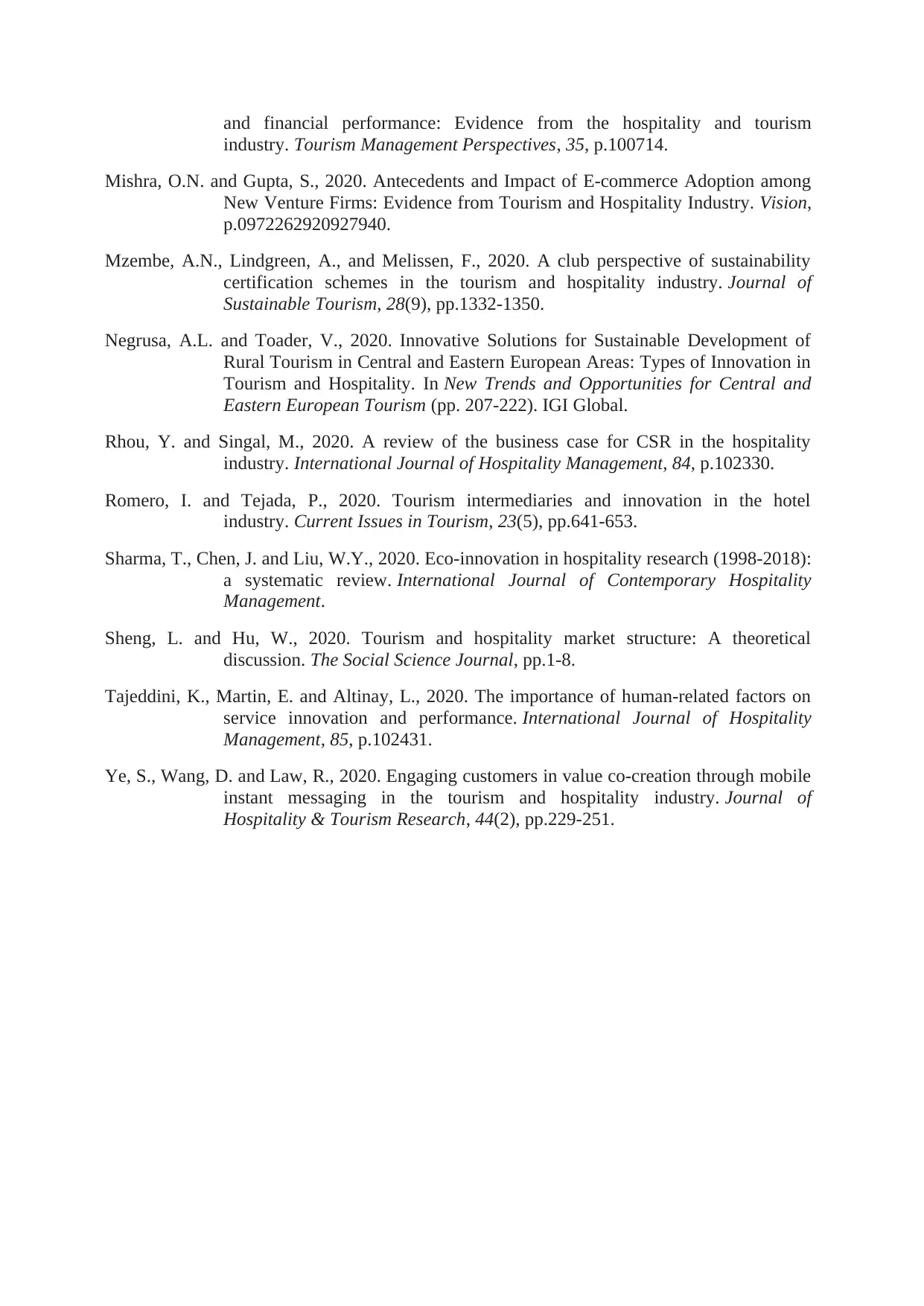
and financial performance: Evidence from the hospitality and tourism
industry. Tourism Management Perspectives, 35, p.100714.
Mishra, O.N. and Gupta, S., 2020. Antecedents and Impact of E-commerce Adoption among
New Venture Firms: Evidence from Tourism and Hospitality Industry. Vision,
p.0972262920927940.
Mzembe, A.N., Lindgreen, A., and Melissen, F., 2020. A club perspective of sustainability
certification schemes in the tourism and hospitality industry. Journal of
Sustainable Tourism, 28(9), pp.1332-1350.
Negrusa, A.L. and Toader, V., 2020. Innovative Solutions for Sustainable Development of
Rural Tourism in Central and Eastern European Areas: Types of Innovation in
Tourism and Hospitality. In New Trends and Opportunities for Central and
Eastern European Tourism (pp. 207-222). IGI Global.
Rhou, Y. and Singal, M., 2020. A review of the business case for CSR in the hospitality
industry. International Journal of Hospitality Management, 84, p.102330.
Romero, I. and Tejada, P., 2020. Tourism intermediaries and innovation in the hotel
industry. Current Issues in Tourism, 23(5), pp.641-653.
Sharma, T., Chen, J. and Liu, W.Y., 2020. Eco-innovation in hospitality research (1998-2018):
a systematic review. International Journal of Contemporary Hospitality
Management.
Sheng, L. and Hu, W., 2020. Tourism and hospitality market structure: A theoretical
discussion. The Social Science Journal, pp.1-8.
Tajeddini, K., Martin, E. and Altinay, L., 2020. The importance of human-related factors on
service innovation and performance. International Journal of Hospitality
Management, 85, p.102431.
Ye, S., Wang, D. and Law, R., 2020. Engaging customers in value co-creation through mobile
instant messaging in the tourism and hospitality industry. Journal of
Hospitality & Tourism Research, 44(2), pp.229-251.
industry. Tourism Management Perspectives, 35, p.100714.
Mishra, O.N. and Gupta, S., 2020. Antecedents and Impact of E-commerce Adoption among
New Venture Firms: Evidence from Tourism and Hospitality Industry. Vision,
p.0972262920927940.
Mzembe, A.N., Lindgreen, A., and Melissen, F., 2020. A club perspective of sustainability
certification schemes in the tourism and hospitality industry. Journal of
Sustainable Tourism, 28(9), pp.1332-1350.
Negrusa, A.L. and Toader, V., 2020. Innovative Solutions for Sustainable Development of
Rural Tourism in Central and Eastern European Areas: Types of Innovation in
Tourism and Hospitality. In New Trends and Opportunities for Central and
Eastern European Tourism (pp. 207-222). IGI Global.
Rhou, Y. and Singal, M., 2020. A review of the business case for CSR in the hospitality
industry. International Journal of Hospitality Management, 84, p.102330.
Romero, I. and Tejada, P., 2020. Tourism intermediaries and innovation in the hotel
industry. Current Issues in Tourism, 23(5), pp.641-653.
Sharma, T., Chen, J. and Liu, W.Y., 2020. Eco-innovation in hospitality research (1998-2018):
a systematic review. International Journal of Contemporary Hospitality
Management.
Sheng, L. and Hu, W., 2020. Tourism and hospitality market structure: A theoretical
discussion. The Social Science Journal, pp.1-8.
Tajeddini, K., Martin, E. and Altinay, L., 2020. The importance of human-related factors on
service innovation and performance. International Journal of Hospitality
Management, 85, p.102431.
Ye, S., Wang, D. and Law, R., 2020. Engaging customers in value co-creation through mobile
instant messaging in the tourism and hospitality industry. Journal of
Hospitality & Tourism Research, 44(2), pp.229-251.
1 out of 11
Related Documents
Your All-in-One AI-Powered Toolkit for Academic Success.
+13062052269
info@desklib.com
Available 24*7 on WhatsApp / Email
![[object Object]](/_next/static/media/star-bottom.7253800d.svg)
Unlock your academic potential
Copyright © 2020–2026 A2Z Services. All Rights Reserved. Developed and managed by ZUCOL.





